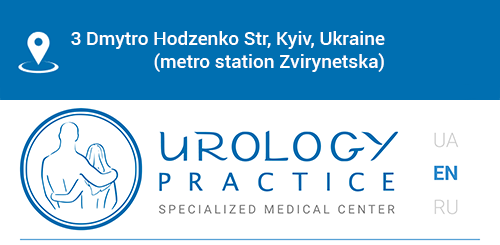

Removal of atheroma in the area of external genital organs
| Removal of atheromas in the area external genitalia:
|
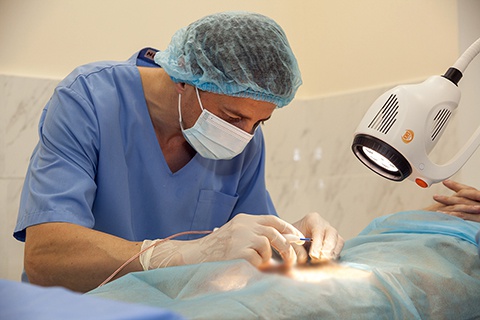
Worried about atheroma? Call us: |
Atheroma on the external genitalia is a benign formation that appears as a result of blockage of the ducts of the sebaceous glands.
Most often, atheromas occur on the scrotum - about 90 - 95% of cases.
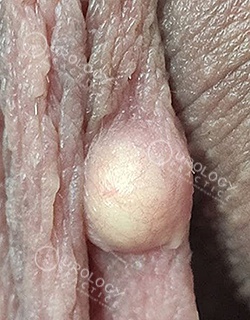
Atheroma of the scrotum
What does atheroma of the scrotum look like?
Atheroma of the scrotum is a seal of a rounded or oval shape. Usually small in size. If you look at it more closely, you can see a hole in the capsule of the build-up, through which viscous contents with an unpleasant smell come out. This is the secret of the sebaceous gland, which does not come out due to blockage of the duct.
Causes of atheroma in the scrotum:
The scrotum contains a large number of sebaceous and sweat glands. The glands perform the function of thermoregulation, because when the temperature changes, the production of spermatozoa is disrupted.
The reason that directly leads to the appearance of a skin formation is an abnormally increased work of the sebaceous glands.
Also, such a blockage can occur: if the rules of intimate hygiene are not observed, if the hormonal background changes, obesity, or if the sebaceous gland is injured.
Why are atheromas of the scrotum dangerous?
First of all, it is suppuration of atheroma:
- an increase in atheroma in size;
- skin redness;
- cyanosis of the skin around the formation;
- soreness of atheroma;
- increase in body temperature.
Even if the atheroma has not become inflamed, then the question of the normal functioning of the reproductive sphere is acute. Due to the increase in internal pressure, there are problems with the production of sperm, which can lead to infertility.
Self-opening of the abscess can lead to the growth of a fistula.
| Treatment of atheromas of external genital organs Treatment of pathology is only surgical: it consists in its removal. |
Timely removal of atheroma will help get rid of a cosmetic defect and prevent serious complications.
In the SMC "Urological Practice" the operation is performed by the radio wave method, using a radio knife.
The use of the radio wave method allows the procedure to be carried out under local anesthesia and with a minimal risk of bleeding.
| the duration of the procedure is 15-20 minutes. | |
| without scars. | |
| without pain. | |
| the rehabilitation period is up to 14 days, depending on the location, size and number of atheromas. |
Physiotherapy will help speed up healing.
Urologists use minimally invasive surgery, which is as painless and safe as possible for the patient. And this became possible thanks to the use of modern equipment, in particular, a radio knife.
A radio knife is a machine that uses high frequency radio waves to perform surgery. The waves are directed to the tissues using an electrode that concentrates the energy of the radio waves. This energy destroys cellular structures, they seem to evaporate, which eliminates bleeding.
Radio Knife Benefits:
![]()
no bleeding.
![]()
side effects are unlikely.
![]()
no scars.
![]()
no sutures required.
![]()
flawless cosmetic effect.
![]()
short healing period.
![]()
you can do tissue histology
if necessary.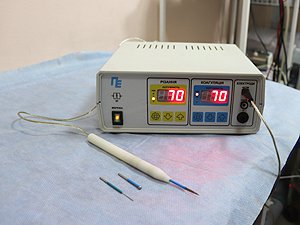
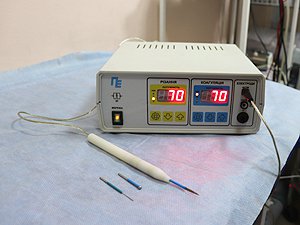
Radio knife
Why radio knife is better than laser:
| allows you to control the depth of penetration of the device beam into the dermis as accurately as possible. |
| the area of damage to the surrounding tissue is 10 times smaller. |
| the recovery period is faster. |
Atheroma removal technique
The procedure is carried out in the following order:
| the skin is treated with an antiseptic, an anesthetic is injected. | |
| with the help of a radio-knife, the doctor exfoliates the atheroma together with the capsule. The place of husking is washed with an antiseptic. | |
| the wound is treated, a sterile bandage is applied. |
Remove atheroma of the scrotum, removal of atheroma external
genital organs:
(the price is for the whole operation, including local anesthesia)
| 1 | Removal of atheroma of the I category of complexity* |
4500 UAH |
| 2 | Removal of atheroma of the II category of complexity* |
7000 UAH |
| 3 | Removal of atheroma of the III category of complexity* |
10000 UAH |
| 4 | Preoperative consultation of a urologist |
750 UAH |
* the complexity of removing atheroma depends on their number and the size (magnitude) of the atheroma themselves.
Make an appointment: |
After operation:
| the patient is allowed to go home immediately after the procedure. | |
| after removal of atheroma, it is required to change sterile bandage. For this, the patient can come to the clinic, or do the bandages on their own at home. |
| If there is a risk of inflammation, the doctor will prescribe an antibiotic. Take according to prescription. | |
| On the first day after the procedure, you can take an anesthetic to relieve pain. | |
| Daily hygiene of the genitals. The wound area should not be wetted, the scrotum is wiped with a clean, damp cloth. | |
| With proper care, complications after removal of atheroma rarely occur. But still, if the pain intensifies, the wound bleeds even a day after the procedure, or pus appears, you need to see a doctor as soon as possible. |
Prevention of atheroma:
| daily hygiene of the genital organs; | |
| undergo annual preventive examination by a urologist; | |
| do not epilate with the removal of the hair root; | |
| lead a healthy lifestyle, control nutrition. |









